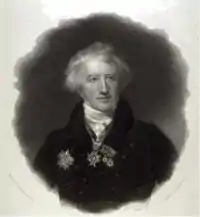George Thomas Doo
George Thomas Doo RA (6 January 1800 – 13 November 1886) was an English engraver.
George Thomas Doo | |
|---|---|
 | |
| Born | George Thomas Doo 6 January 1800 Surrey |
| Died | 13 November 1886 (aged 86)Sutton, London |
| Nationality | British |
| Occupation | Engraver, Historical engraver of Queen Victoria |
| Years active | 1800-1886 |
Life
Doo was born near Christ Church in Southwark, London. His teacher was Charles Heath. In 1825 he went to Paris.[1] There he studied in the atelier of Suisse, and also attended the school of Gros, according to Thompson Cooper; the Oxford Dictionary of National Biography suggests his study under Charles-Alexandre Suisse might have been later. He acquired the techniques of drawing from the life, and passed them on to pupils in England.[2][3] He took on William Duffield as a non-paying pupil,[4] and William Thomas Roden was an apprentice.[5] Another pupil was Thomas Leeming Grundy.[1]
In 1836 Doo was made Engraver in Ordinary to William IV, and later to Queen Victoria. At this period he worked for Francis Moon.[1]
Doo became a Fellow of the Royal Society in 1851.[6] He was made a Royal Academician in 1857.[1][7]
Doo died in Sutton, Surrey.[1]
Works
In 1824 he published his first plate, after a portrait of Prince Frederick, Duke of York and Albany by Thomas Lawrence.
.jpeg.webp)

Doo's more well-known works include his 1848 line-engraving The Combat after William Etty's painting from 1825. He is also known for his engraving of "Knox preaching before the Lords of the Congregation," after David Wilkie, "Italian Pilgrims coming in sight of Rome" after Eastlake, the "Infant Christ" after Raphael and the "Ecce Homo" after Correggio. His 1864 engraving of the "Raising of Lazarus" by Sebastiano del Piombo took him eight years.
References
| Wikimedia Commons has media related to George Thomas Doo. |
- Hunnisett, B. "Doo, George Thomas". Oxford Dictionary of National Biography (online ed.). Oxford University Press. doi:10.1093/ref:odnb/64825. (Subscription or UK public library membership required.)
- Thompson Cooper, Men of the Time: a dictionary of contemporaries, containing biographical notices of eminent characters of both sexes (1884) p. 348;archive.org.
- Clara Clement, Artists of the Nineteenth Century and Their Works: A Handbook Containing Two Thousand and Fifty Biographical Sketches Volume 1 (2010 reprint), p. 211; Google Books.
- . Dictionary of National Biography. London: Smith, Elder & Co. 1885–1900.
- . Dictionary of National Biography. London: Smith, Elder & Co. 1885–1900.
- "Library and Archive Catalogue". Royal Society. Retrieved 27 November 2010.
- Joseph Thomas. The Universal Dictionary of Biography and Mythology. p. 731.